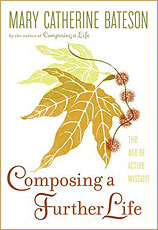In her pioneering work Composing a Life (1989), Mary Catherine Bateson outlined "life as an improvisatory art" using the experiences of five women, including herself, to illustrate that sometimes breakdowns can lead to breakthroughs. People are living longer and staying active in the United States, so much so that Bateson identifies a new stage of life she calls Adulthood II. She is very interested in what this means for Baby Boomers who are just beginning to reach age 65:
"We have not added decades to life expectancy by simply extending old age; instead we have opened up a new space partway through the life course, a second and different kind of adulthood that precedes old age, and as a result every stage of life is undergoing change."
The author is convinced that "Adulthood II" comes as a gift and offers new possibilities to reshape public and family life. Bateson admits that she likes to think of men and women as artists of their own lives. Hence, there is no one size fits all for "Adulthood II." Some will travel; others stay home and tap into their hitherto unexpressed creativity; still others will volunteer their services to help the homeless. None can control what will happen in the future so they all share one necessary virtue: resiliency.
Bateson includes some references to her favorite psychologist, Erik Erickson, and his developmental stages of life as well as to her famous father and mother, Gregory Bateson and Margaret Mead. To illustrate the diversity of activities possible in Adulthood II, she writes about a retired boatyard worker who has found new fulfillment as a silversmith and making jewelry; an African-American woman who is in the midst of grandmothering; an academic who has switched from teaching to mentoring; the retired dean of a New York City cathedral who has set up a Interfaith Center; and Jane Fonda who has moved beyond acting to an inner quest of spiritual growth. Ram Dass has stated that "the role of elders is to move away from ego into soul."
Bateson is very optimistic about this stage of life before old age when individuals can discover fresh avenues of work and creativity; deal with death and come up with their own legacy as they see it; do inner soul work; and contribute to the betterment of society with the "active wisdom" that has come from a long life.
Composing a Further Life offers an adventuresome and holistic agenda for Adulthood II and opens the door for many to envisage a more positive appreciation of this stage of life.
